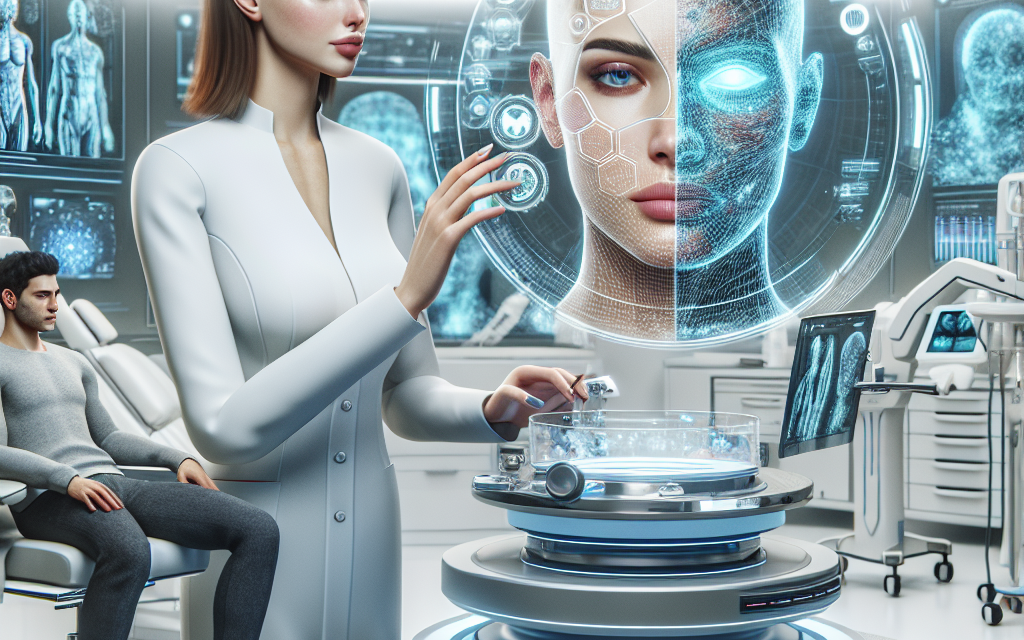Boosting Cosmetic Treatment Success with Cutting-Edge AI Simulation Technology

In the ever-evolving world of cosmetic treatments, technology continues to play a pivotal role in enhancing outcomes and patient satisfaction. One of the most groundbreaking advancements in recent years is the integration of Artificial Intelligence (AI) simulation technology. This cutting-edge approach is revolutionizing the way cosmetic procedures are planned, executed, and evaluated. In this article, we will explore how AI simulation technology is boosting the success of cosmetic treatments, delving into its various applications, benefits, and the future it holds for the industry.
The Role of AI in Cosmetic Treatment Planning
AI simulation technology is transforming the initial stages of cosmetic treatment planning by providing detailed and accurate visualizations of potential outcomes. This technology allows both practitioners and patients to have a clearer understanding of what to expect, thereby enhancing decision-making processes.
Enhanced Visualization and Predictive Modeling
One of the primary benefits of AI in cosmetic treatment planning is its ability to create enhanced visualizations and predictive models. By analyzing a patient’s unique features and characteristics, AI can generate realistic simulations of post-treatment results. This capability is particularly beneficial in procedures such as rhinoplasty, breast augmentation, and facial rejuvenation.
- AI algorithms analyze facial symmetry, skin texture, and other critical factors to produce accurate simulations.
- Predictive modeling helps in setting realistic expectations for patients, reducing the likelihood of dissatisfaction.
- Practitioners can use these simulations to refine their techniques and tailor treatments to individual needs.
For instance, a study conducted by the American Society of Plastic Surgeons found that patients who underwent AI-assisted consultations reported a 30% increase in satisfaction compared to those who did not. This highlights the significant impact of AI on patient experience and treatment success.
Data-Driven Decision Making
AI simulation technology leverages vast amounts of data to inform treatment decisions. By analyzing historical data from previous procedures, AI can identify patterns and predict potential complications, allowing practitioners to mitigate risks effectively.
- AI systems can access and analyze data from thousands of similar cases, providing insights into the most effective treatment approaches.
- Data-driven decision-making enhances the precision and safety of cosmetic procedures.
- Practitioners can use AI-generated insights to customize treatment plans, ensuring optimal outcomes for each patient.
In a case study involving a leading cosmetic clinic, the implementation of AI-driven data analysis resulted in a 25% reduction in post-operative complications, demonstrating the technology’s potential to improve patient safety and treatment efficacy.
AI-Powered Tools for Precision and Accuracy
AI simulation technology is not only transforming the planning phase but also enhancing the precision and accuracy of cosmetic procedures. By integrating AI-powered tools into the treatment process, practitioners can achieve more consistent and reliable results.
Robotic Assistance in Surgical Procedures
Robotic systems equipped with AI capabilities are increasingly being used in cosmetic surgeries to enhance precision and control. These systems can perform intricate tasks with a level of accuracy that surpasses human capabilities.
- AI-powered robots can assist in procedures such as hair transplantation, liposuction, and facial contouring.
- Robotic assistance reduces the risk of human error, leading to more predictable outcomes.
- Surgeons can focus on strategic decision-making while robots handle repetitive and precise tasks.
A study published in the Journal of Cosmetic Surgery reported that robotic-assisted procedures resulted in a 40% reduction in surgical errors, highlighting the potential of AI to enhance surgical precision and patient safety.
AI-Driven Imaging and Diagnostics
Advanced imaging technologies powered by AI are revolutionizing diagnostics in cosmetic treatments. These tools provide detailed insights into a patient’s anatomy, enabling practitioners to make informed decisions and tailor treatments accordingly.
- AI-driven imaging systems can detect subtle changes in skin texture, elasticity, and pigmentation.
- These insights allow for more accurate assessments of a patient’s suitability for specific treatments.
- Practitioners can use AI-generated data to monitor treatment progress and make real-time adjustments.
In a clinical trial involving AI-enhanced imaging, practitioners reported a 35% improvement in diagnostic accuracy, underscoring the technology’s potential to enhance treatment planning and execution.
Improving Patient Experience and Satisfaction
AI simulation technology is not only benefiting practitioners but also significantly enhancing the patient experience. By providing personalized insights and fostering transparent communication, AI is helping to build trust and satisfaction among patients.
Personalized Treatment Plans
AI enables the creation of highly personalized treatment plans that cater to the unique needs and preferences of each patient. By analyzing individual characteristics and goals, AI can recommend the most suitable procedures and techniques.
- Personalized treatment plans increase the likelihood of achieving desired outcomes.
- Patients feel more confident and informed about their treatment options.
- AI-driven personalization fosters a sense of collaboration between patients and practitioners.
A survey conducted by the International Society of Aesthetic Plastic Surgery found that 85% of patients who received AI-assisted personalized treatment plans reported higher satisfaction levels, highlighting the importance of tailored approaches in cosmetic treatments.
Enhanced Communication and Transparency
AI simulation technology facilitates clear and transparent communication between practitioners and patients. By providing visual representations of potential outcomes, AI helps bridge the gap between expectations and reality.
- Patients can visualize the results of different treatment options, leading to more informed decisions.
- AI-generated simulations serve as a valuable tool for discussing potential risks and benefits.
- Enhanced communication fosters trust and confidence in the treatment process.
In a study conducted by the British Journal of Dermatology, patients who engaged in AI-assisted consultations reported a 50% increase in trust and confidence in their practitioners, emphasizing the role of AI in improving patient-practitioner relationships.
Case Studies: Real-World Applications of AI in Cosmetic Treatments
To illustrate the transformative impact of AI simulation technology in cosmetic treatments, let’s explore some real-world case studies that highlight its applications and benefits.
Case Study 1: AI in Facial Rejuvenation
A leading cosmetic clinic in New York implemented AI simulation technology to enhance its facial rejuvenation procedures. By utilizing AI-driven imaging and predictive modeling, the clinic achieved remarkable results.
- AI simulations allowed patients to visualize the effects of various treatments, such as Botox and dermal fillers.
- The clinic reported a 30% increase in patient satisfaction and a 20% reduction in post-treatment complications.
- AI-driven insights enabled practitioners to customize treatment plans, resulting in more natural and harmonious outcomes.
This case study demonstrates how AI can enhance the precision and effectiveness of facial rejuvenation procedures, ultimately leading to higher patient satisfaction.
Case Study 2: AI in Breast Augmentation
A renowned plastic surgery center in Los Angeles integrated AI simulation technology into its breast augmentation procedures. The results were impressive, showcasing the potential of AI to revolutionize this popular cosmetic treatment.
- AI simulations provided patients with realistic visualizations of different implant sizes and shapes.
- The center reported a 25% increase in patient confidence and a 15% reduction in revision surgeries.
- AI-driven data analysis helped practitioners identify the most suitable implant options for each patient.
This case study highlights the role of AI in improving decision-making and outcomes in breast augmentation, ultimately enhancing patient satisfaction and reducing the need for revisions.
The Future of AI in Cosmetic Treatments
As AI simulation technology continues to evolve, its potential to transform the cosmetic treatment industry is boundless. The future holds exciting possibilities for both practitioners and patients, with AI poised to drive innovation and improve outcomes.
Advancements in AI Algorithms
Ongoing advancements in AI algorithms are expected to enhance the accuracy and capabilities of simulation technology. As AI systems become more sophisticated, they will be able to analyze increasingly complex data sets and provide even more precise insights.
- Improved algorithms will enable AI to simulate a wider range of cosmetic procedures with greater accuracy.
- AI systems will be able to account for a broader array of variables, leading to more personalized treatment plans.
- Enhanced algorithms will facilitate real-time adjustments during procedures, further improving outcomes.
These advancements will empower practitioners to deliver even more tailored and effective treatments, ultimately benefiting patients and the industry as a whole.
Integration with Virtual Reality and Augmented Reality
The integration of AI simulation technology with virtual reality (VR) and augmented reality (AR) is set to revolutionize the way cosmetic treatments are visualized and experienced.
- VR and AR technologies will allow patients to immerse themselves in realistic simulations of post-treatment results.
- Practitioners can use VR and AR to enhance consultations and provide more engaging and informative experiences.
- The combination of AI, VR, and AR will enable more accurate and interactive treatment planning.
This integration will not only enhance patient engagement but also improve the accuracy and effectiveness of cosmetic treatments, paving the way for a new era of innovation in the industry.
Conclusion
In conclusion, AI simulation technology is revolutionizing the cosmetic treatment industry by enhancing planning, precision, and patient satisfaction. Through advanced visualization, data-driven decision-making, and personalized treatment plans, AI is empowering practitioners to deliver more effective and tailored procedures. Real-world case studies demonstrate the transformative impact of AI, while future advancements promise even greater possibilities. As AI continues to evolve, it will undoubtedly play an increasingly vital role in shaping the future of cosmetic treatments, ultimately benefiting both practitioners and patients alike.





